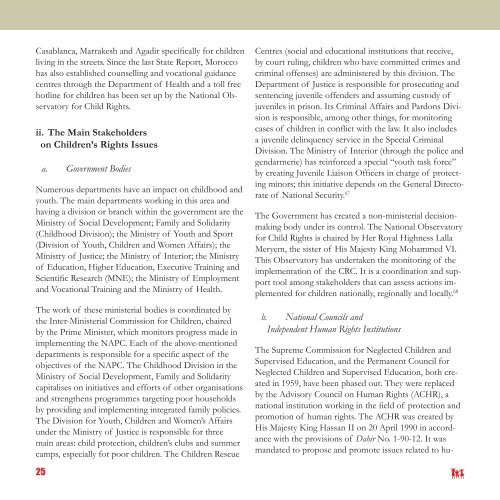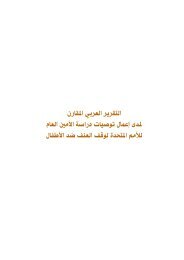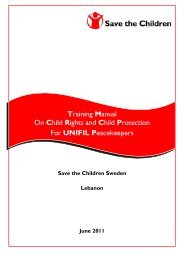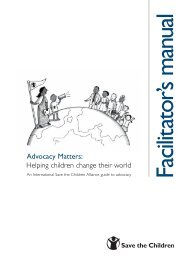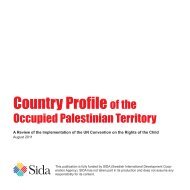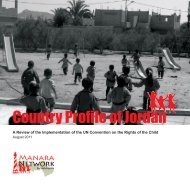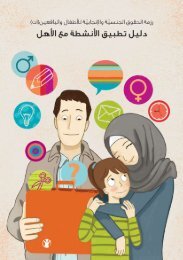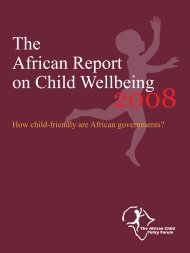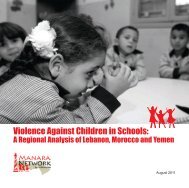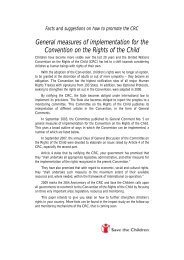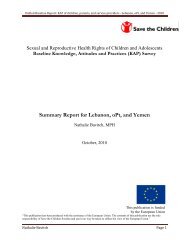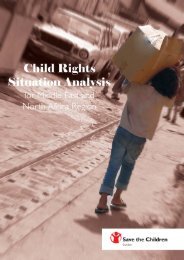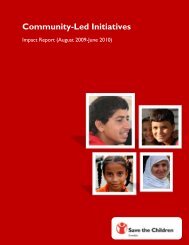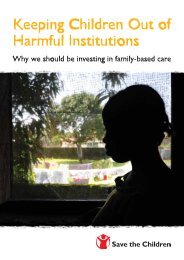Country Profile of Morocco - International Bureau of Children's Rights
Country Profile of Morocco - International Bureau of Children's Rights
Country Profile of Morocco - International Bureau of Children's Rights
Create successful ePaper yourself
Turn your PDF publications into a flip-book with our unique Google optimized e-Paper software.
Casablanca, Marrakesh and Agadir specifically for children<br />
living in the streets. Since the last State Report, <strong>Morocco</strong><br />
has also established counselling and vocational guidance<br />
centres through the Department <strong>of</strong> Health and a toll free<br />
hotline for children has been set up by the National Observatory<br />
for Child <strong>Rights</strong>.<br />
ii. The Main Stakeholders<br />
on Children’s <strong>Rights</strong> Issues<br />
a.<br />
25<br />
Government Bodies<br />
Numerous departments have an impact on childhood and<br />
youth. The main departments working in this area and<br />
having a division or branch within the government are the<br />
Ministry <strong>of</strong> Social Development; Family and Solidarity<br />
(Childhood Division); the Ministry <strong>of</strong> Youth and Sport<br />
(Division <strong>of</strong> Youth, Children and Women Affairs); the<br />
Ministry <strong>of</strong> Justice; the Ministry <strong>of</strong> Interior; the Ministry<br />
<strong>of</strong> Education, Higher Education, Executive Training and<br />
Scientific Research (MNE); the Ministry <strong>of</strong> Employment<br />
and Vocational Training and the Ministry <strong>of</strong> Health.<br />
The work <strong>of</strong> these ministerial bodies is coordinated by<br />
the Inter-Ministerial Commission for Children, chaired<br />
by the Prime Minister, which monitors progress made in<br />
implementing the NAPC. Each <strong>of</strong> the above-mentioned<br />
departments is responsible for a specific aspect <strong>of</strong> the<br />
objectives <strong>of</strong> the NAPC. The Childhood Division in the<br />
Ministry <strong>of</strong> Social Development, Family and Solidarity<br />
capitalises on initiatives and efforts <strong>of</strong> other organisations<br />
and strengthens programmes targeting poor households<br />
by providing and implementing integrated family policies.<br />
The Division for Youth, Children and Women’s Affairs<br />
under the Ministry <strong>of</strong> Justice is responsible for three<br />
main areas: child protection, children’s clubs and summer<br />
camps, especially for poor children. The Children Rescue<br />
Centres (social and educational institutions that receive,<br />
by court ruling, children who have committed crimes and<br />
criminal <strong>of</strong>fenses) are administered by this division. The<br />
Department <strong>of</strong> Justice is responsible for prosecuting and<br />
sentencing juvenile <strong>of</strong>fenders and assuming custody <strong>of</strong><br />
juveniles in prison. Its Criminal Affairs and Pardons Division<br />
is responsible, among other things, for monitoring<br />
cases <strong>of</strong> children in conflict with the law. It also includes<br />
a juvenile delinquency service in the Special Criminal<br />
Division. The Ministry <strong>of</strong> Interior (through the police and<br />
gendarmerie) has reinforced a special “youth task force”<br />
by creating Juvenile Liaison Officers in charge <strong>of</strong> protecting<br />
minors; this initiative depends on the General Directorate<br />
<strong>of</strong> National Security. 67<br />
The Government has created a non-ministerial decisionmaking<br />
body under its control. The National Observatory<br />
for Child <strong>Rights</strong> is chaired by Her Royal Highness Lalla<br />
Meryem, the sister <strong>of</strong> His Majesty King Mohammed VI.<br />
This Observatory has undertaken the monitoring <strong>of</strong> the<br />
implementation <strong>of</strong> the CRC. It is a coordination and support<br />
tool among stakeholders that can assess actions implemented<br />
for children nationally, regionally and locally. 68<br />
b. National Councils and<br />
Independent Human <strong>Rights</strong> Institutions<br />
The Supreme Commission for Neglected Children and<br />
Supervised Education, and the Permanent Council for<br />
Neglected Children and Supervised Education, both created<br />
in 1959, have been phased out. They were replaced<br />
by the Advisory Council on Human <strong>Rights</strong> (ACHR), a<br />
national institution working in the field <strong>of</strong> protection and<br />
promotion <strong>of</strong> human rights. The ACHR was created by<br />
His Majesty King Hassan II on 20 April 1990 in accordance<br />
with the provisions <strong>of</strong> Dahir No. 1-90-12. It was<br />
mandated to propose and promote issues related to hu-


